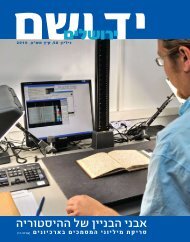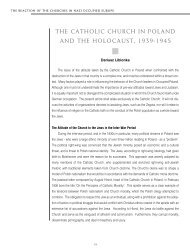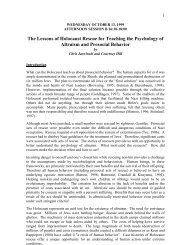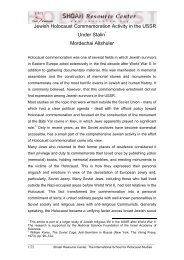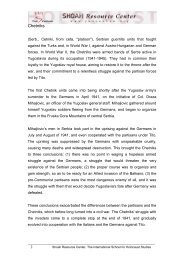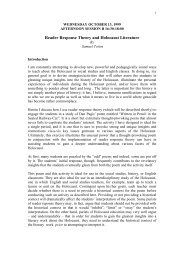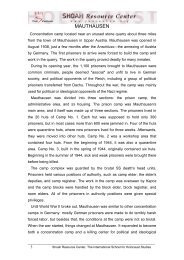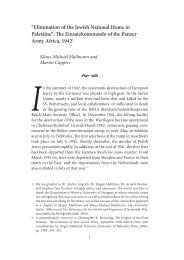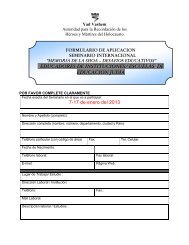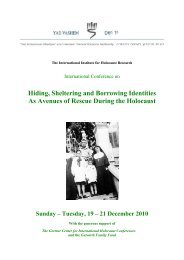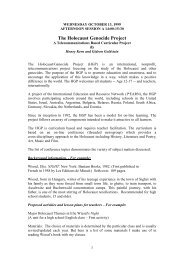Portugal, the Consuls, and the Jewish Refugees ... - Yad Vashem
Portugal, the Consuls, and the Jewish Refugees ... - Yad Vashem
Portugal, the Consuls, and the Jewish Refugees ... - Yad Vashem
You also want an ePaper? Increase the reach of your titles
YUMPU automatically turns print PDFs into web optimized ePapers that Google loves.
S.Wyman, in his classic Paper Walls, presents an eclectic variety of attitudestaken by American consuls in relation to refugees ― Jews <strong>and</strong> non-Jews. Andin spite of <strong>the</strong> critical tone evident in <strong>the</strong> book, <strong>the</strong> general picture of <strong>the</strong>consuls is more positive than negative. Except for some cases of extremeintransigence, most of <strong>the</strong>m collaborated with aid organizations (Quakers,Unitarian Service, American Friends Service Committee, etc.) <strong>and</strong> empathizedwith <strong>the</strong> cause of <strong>the</strong> refugees. 40The policy of <strong>the</strong> American states <strong>and</strong> <strong>the</strong> attitude of <strong>the</strong>ir consuls was vital,since obtaining a Portuguese visa <strong>and</strong> transit through Spain was dependanton <strong>the</strong>ir being a final haven. The importance of <strong>the</strong> Portuguese consuls can bemeasured by <strong>the</strong>ir courage to help Jews deprived of visas to o<strong>the</strong>r countries,in <strong>the</strong> first stage, <strong>and</strong> by <strong>the</strong>ir strategic positions, as neutral consular agents,in <strong>the</strong> stage of deportations to <strong>the</strong> extermination camps.A Paragon of Ambivalence-Ambassador Alberto daVeiga Simões 41Veiga Simões began his consular <strong>and</strong> diplomatic career with <strong>the</strong>establishment of <strong>the</strong> republic; he was foreign minister for a short time in 1921.During this period he absorbed liberal <strong>and</strong> democratic ideas, a fact which, at40Wyman, Paper Walls, pp. 155-168.41Alberto da Veiga Simões was born on December 16, 1888, in Arganil.From an early age he showed his literary skills, writing short stories <strong>and</strong>essays on political issues for local newspapers. He studied law at <strong>the</strong>University of Coimbra, receiving his diploma in 1910. Till he entered <strong>the</strong>consular corps in 1915, Alberto da Veiga Simões practiced law <strong>and</strong> was alsoinvolved in <strong>the</strong> politics of Arganil, aspiring to become a national figure. Hisrepublican leanings led him to become a journalist, writing for <strong>the</strong> weekly of<strong>the</strong> Centro Republicano Evolucionista [Evolutionary Republican Center] in hiscity, having been invited by Antonio José de Almeida, president of <strong>the</strong> CentralCommittee of <strong>the</strong> Evolutionary Party, to become <strong>the</strong> political editor of itsorgan: República. See Neves, ed., Veiga Simões, Vida e Obra (Arganil:Publication of <strong>the</strong> City Council, 1988). This study, published in his memory<strong>and</strong> <strong>the</strong>refore apologetic, is clearly anti-authoritarian. "Today we can no longerdoubt: <strong>the</strong> memory of Veiga Simões has not been respected with <strong>the</strong> attentionit deserves, for reasons whose roots are clearly political. Who knows ifunconsciously, but <strong>the</strong> truth is that <strong>the</strong> political struggles in which he becameinvolved in <strong>the</strong> early years of <strong>the</strong> Republic increased later, during <strong>the</strong> longyears of authoritarianism which followed 1926, as if it were a crime to be ademocrat." p. 13.__________________________________________________________________________12/31Shoah Resource Center, The International School for Holocaust Studies



